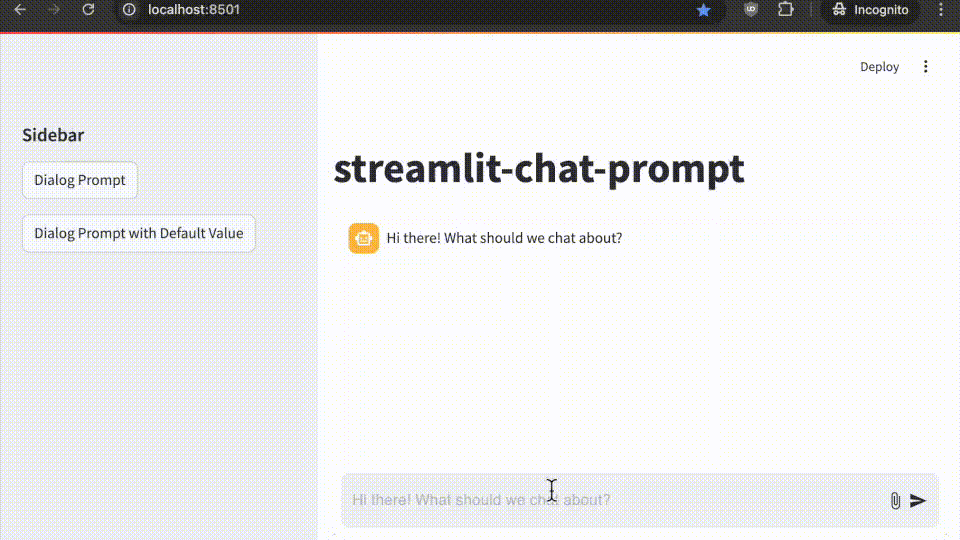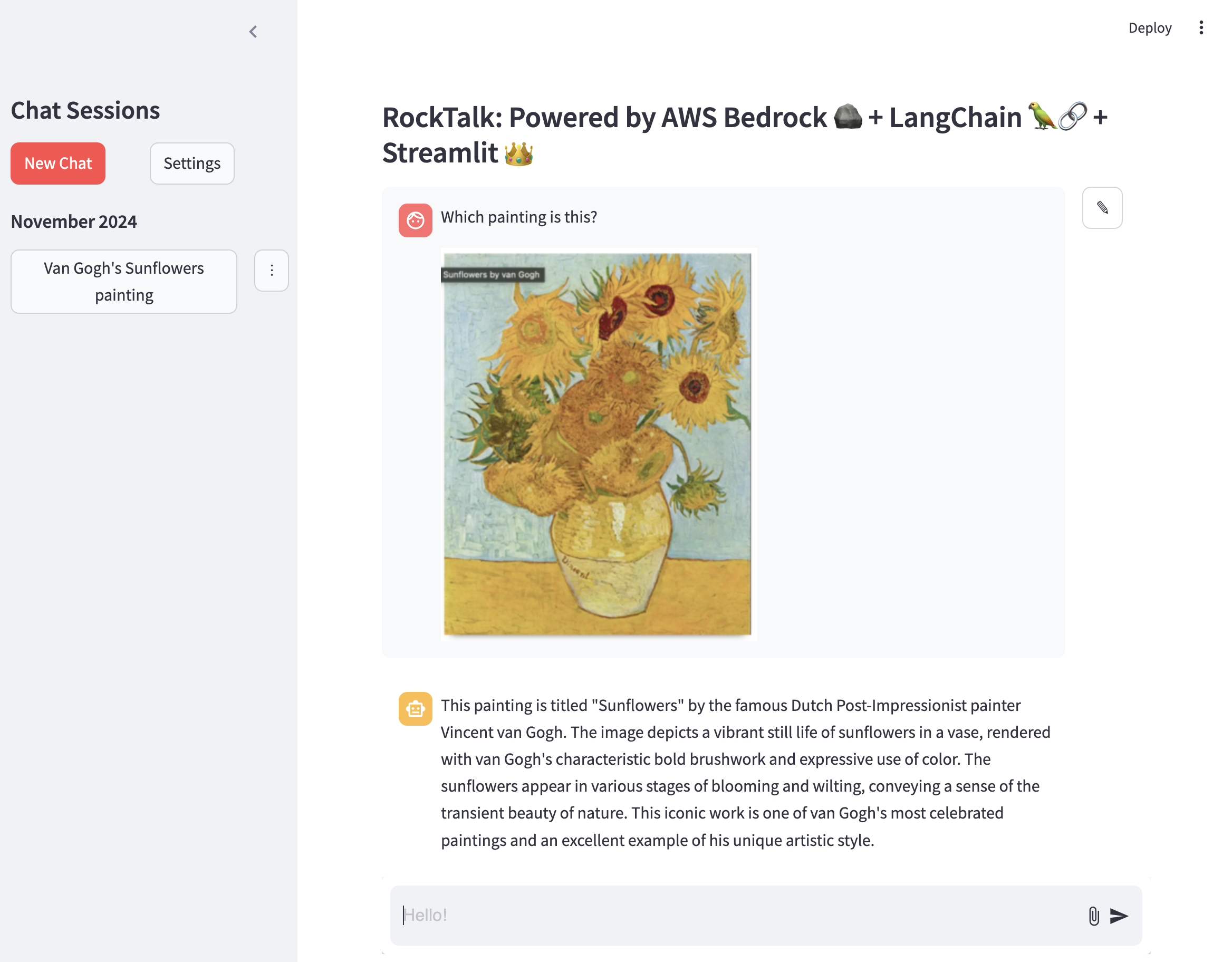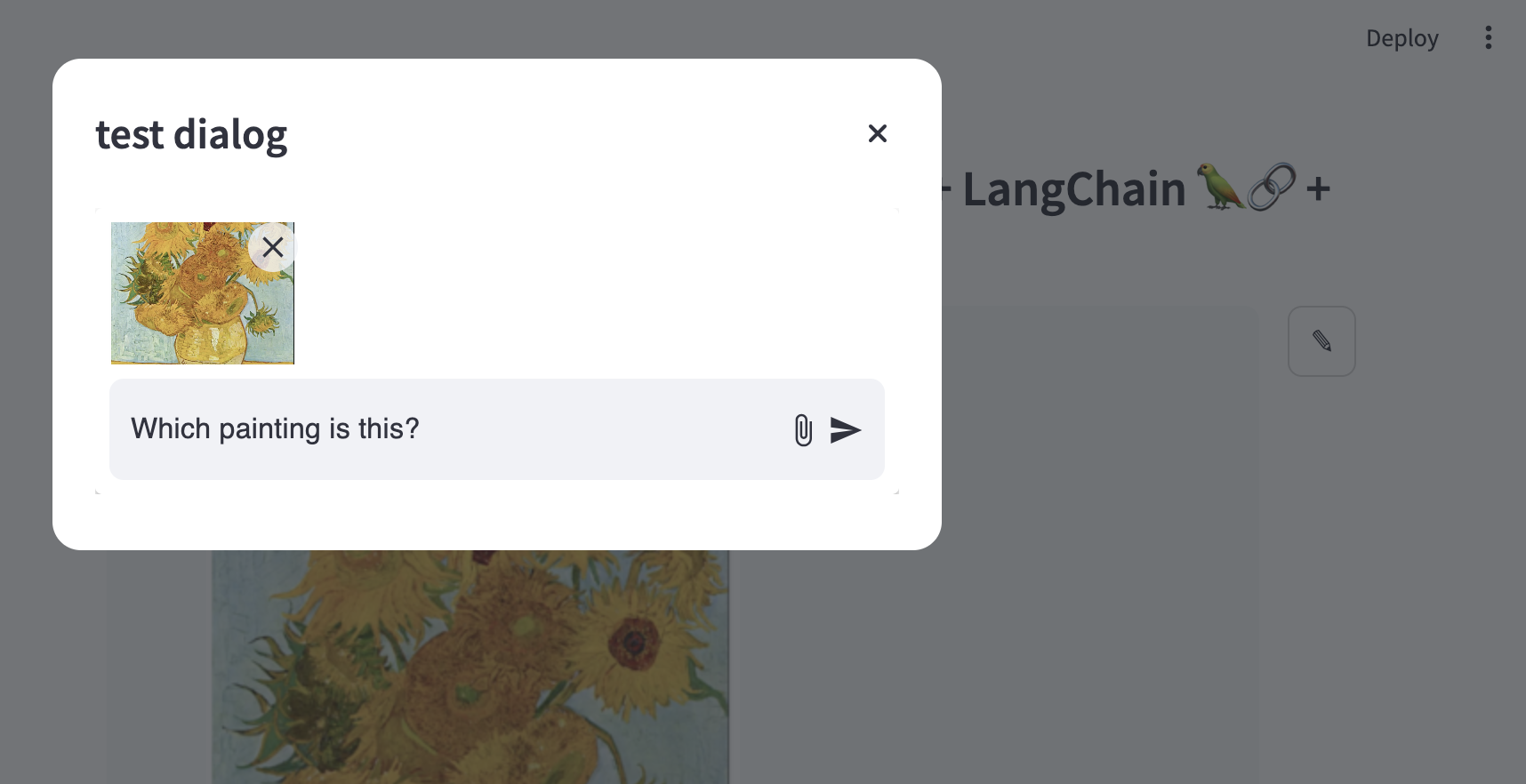Streamlit component that allows you to create a chat prompt with paste and image attachment support
Project description
Streamlit Chat Prompt
A Streamlit component that provides a modern chat-style prompt with image attachment and paste support. This component was built to mimic the style of streamlit.chat_input while expanding functionality with images. Future work may include addition of speech-to-text input.
Author: Tyler House (@tahouse)
Features
- 📝 Chat-style text input with multi-line support
- 📎 Image attachment support via button or drag-and-drop
- 📋 Paste image support (paste images directly from clipboard)
- 🖼️ Image preview with ability to remove attached images
- ⌨️ Submit with Enter key (Shift+Enter for new line)
- 🎨 Automatic theme integration with Streamlit
- 📱 Responsive design that works well on mobile and desktop
- 🗜️ Automatic image compression/scaling to stay under size limits (customizable, default 5MB)
- 📌 Optional pinned-to-bottom placement for main chat interface (one per app)
- 🔄 Flexible positioning for use in dialogs, sidebars, or anywhere in the app flow
- ✏️ Support for default/editable content - perfect for message editing workflows
- 🔤 Smart focus management - automatically returns to text input after interactions
Installation
pip install streamlit-chat-prompt
Usage
import streamlit as st
from streamlit_chat_prompt import prompt
# Create a chat prompt
response = prompt(
name="chat", # Unique name for the prompt
key="chat", # Unique key for the component instance
placeholder="Hi there! What should we talk about?", # Optional placeholder text
main_bottom=True, # Pin prompt to bottom of main area
max_image_size=5 * 1024 * 1024, # Maximum image size (5MB default)
disabled=False, # Optionally disable the prompt
)
# Handle the response
if response:
if response.message:
st.write(f"Message: {response.message}")
if response.images:
for i, img in enumerate(response.images):
st.write(f"Image {i+1}: {img.type} ({img.format})")
Examples
Here are some usage patterns, or check out rocktalk for a full working example.
-
Main Chat Interface
import base64 from io import BytesIO import streamlit as st from streamlit_chat_prompt import PromptReturn, prompt, ImageData from PIL import Image st.chat_message("assistant").write("Hi there! What should we chat about?") prompt_return: PromptReturn | None = prompt( name="foo", key="chat_prompt", placeholder="Hi there! What should we chat about?", main_bottom=True, ) if prompt_return: with st.chat_message("user"): st.write(prompt_return.message) if prompt_return.images: for image in prompt_return.images: st.divider() image_data: bytes = base64.b64decode(image.data) st.markdown("Ussng `st.image`") st.image(Image.open(BytesIO(image_data))) # or use markdown st.divider() st.markdown("Using `st.markdown`") st.markdown(f"")
-
Dialog Usage and Starting From Existing Message
import base64 from io import BytesIO import streamlit as st from streamlit_chat_prompt import PromptReturn, prompt, ImageData from PIL import Image with st.sidebar: st.header("Sidebar") if st.button("Dialog Prompt", key=f"dialog_prompt_button"): test_dg() if st.button( "Dialog Prompt with Default Value", key=f"dialog_prompt_with_default_button" ): with open("example_images/vangogh.png", "rb") as f: image_data = f.read() image = Image.open(BytesIO(image_data)) base64_image = base64.b64encode(image_data).decode("utf-8") test_dg( default_input=PromptReturn( message="This is a test message with an image", images=[ ImageData(data=base64_image, type="image/png", format="base64") ], ), key="dialog_with_default", )
Component API
prompt()
Main function to create a chat prompt.
Parameters:
name(str): Unique name for this prompt instancekey(str): Unique key for the component instanceplaceholder(str, optional): Placeholder text shown in input fielddefault(Union[str, PromptReturn], optional): Default value for the prompt. Can include text and images using thePromptReturnobject type.main_bottom(bool, optional): Pin prompt to bottom of main area (default: True)max_image_size(int, optional): Maximum image size in bytes (default: 5MB)disabled(bool, optional): Disable the prompt (default: False)
Returns:
Optional[PromptReturn]: Object containing message and images if submitted, None otherwise
PromptReturn
Object returned when user submits the prompt.
Properties:
message(Optional[str]): Text message entered by userimages(Optional[List[ImageData]]): List of attached images
ImageData
Object representing an attached image.
Properties:
type(str): Image MIME type (e.g. "image/jpeg")format(str): Image format (e.g. "base64")data(str): Image data as base64 string
Development
This repository is based on the Streamlit Component template system. If you want to modify or develop the component:
-
Clone the repository
-
Install development dependencies:
pip install -e ".[devel]"
-
Start the frontend development server:
cd streamlit_chat_prompt/frontend npm install npm run start
-
In a separate terminal, run your Streamlit app:
streamlit run your_app.py
License
This project is licensed under the Apache License 2.0 - see the LICENSE file for details.
Project details
Download files
Download the file for your platform. If you're not sure which to choose, learn more about installing packages.
Source Distribution
Built Distribution
File details
Details for the file streamlit_chat_prompt-0.1.5.tar.gz.
File metadata
- Download URL: streamlit_chat_prompt-0.1.5.tar.gz
- Upload date:
- Size: 10.8 kB
- Tags: Source
- Uploaded using Trusted Publishing? Yes
- Uploaded via: twine/5.1.1 CPython/3.12.7
File hashes
| Algorithm | Hash digest | |
|---|---|---|
| SHA256 | 4cfe081696305c5d492c75e184fae0aae02cb56df207a17249e19adc97d566c5 |
|
| MD5 | e64d80454e2ddb2e01e886f481474461 |
|
| BLAKE2b-256 | d31b96d4f7a2139197a113c5f883c8da26c1618abfe4d955e96206a256a353d9 |
Provenance
The following attestation bundles were made for streamlit_chat_prompt-0.1.5.tar.gz:
Publisher:
workflow.yaml on tahouse/streamlit-chat-prompt
-
Statement type:
https://in-toto.io/Statement/v1- Predicate type:
https://docs.pypi.org/attestations/publish/v1 - Subject name:
streamlit_chat_prompt-0.1.5.tar.gz - Subject digest:
4cfe081696305c5d492c75e184fae0aae02cb56df207a17249e19adc97d566c5 - Sigstore transparency entry: 148588707
- Sigstore integration time:
- Predicate type:
File details
Details for the file streamlit_chat_prompt-0.1.5-py3-none-any.whl.
File metadata
- Download URL: streamlit_chat_prompt-0.1.5-py3-none-any.whl
- Upload date:
- Size: 11.0 kB
- Tags: Python 3
- Uploaded using Trusted Publishing? Yes
- Uploaded via: twine/5.1.1 CPython/3.12.7
File hashes
| Algorithm | Hash digest | |
|---|---|---|
| SHA256 | d029aac1d8a8a45d726f75b4a2e3f30c34a15aa06311089845fbbab897541071 |
|
| MD5 | b8faf15e7d2cf2abdb6aa431814ae2bc |
|
| BLAKE2b-256 | 2722f1ca8c771a26d84a9ae4629003b721f0b7830f43d5af91c4f83266835122 |
Provenance
The following attestation bundles were made for streamlit_chat_prompt-0.1.5-py3-none-any.whl:
Publisher:
workflow.yaml on tahouse/streamlit-chat-prompt
-
Statement type:
https://in-toto.io/Statement/v1- Predicate type:
https://docs.pypi.org/attestations/publish/v1 - Subject name:
streamlit_chat_prompt-0.1.5-py3-none-any.whl - Subject digest:
d029aac1d8a8a45d726f75b4a2e3f30c34a15aa06311089845fbbab897541071 - Sigstore transparency entry: 148588709
- Sigstore integration time:
- Predicate type:

















